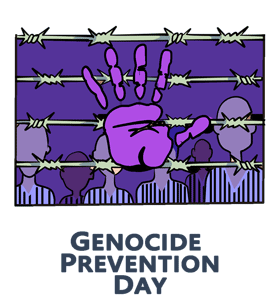Genocide Prevention Day
Genocide Prevention Day Quick Facts in Canada
| AKA Name | "International Day of Commemoration and Dignity of the Victims of the Crime of Genocide and of the Prevention of this Crime" |
|---|---|
| HashtagsCompiled on | #TigrayGenocide |
| Related Hashtags | #Genocide, #InternationalConferenceonGenocidePrevention, #Tigray, #Gaza, #EndGBV |
| 2024 Date | December 9, 2024 |
| 2025 Date | December 9, 2025 |
2024 Holidays & Dates - Canada
| Canadian & Common Holidays | ||
| Misc. & Int'l. Observancesℹ | ||
| Christian Holidays | ||
| Jewish Holidays |
› | ||
